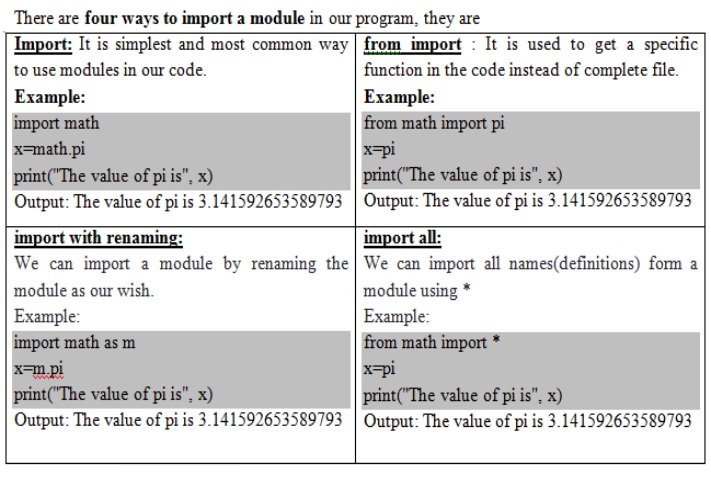Chapter: Problem Solving and Python Programming : Data, Expressions, Statements
Modules - Python
MODULES:
Ø A module is a file containing Python definitions ,functions, statements and instructions.
Ø Standard library of Python is extended as modules.
Ø To use these modules in a program, programmer needs to import the module.
Ø Once we import a module, we can reference or use to any of its functions or variables in our code.
o There is large number of standard modules also available in python.
o Standard modules can be imported the same way as we import our user-defined modules.
o Every module contains many function.
o To access one of the function , you have to specify the name of the module and the name of the function separated by dot . This format is called dot notation.
Syntax:
import module_name
module_name.function_name(variable)
Importing Builtin Module:
import math
x=math.sqrt(25)
print(x)
Importing User Defined Module:
import cal
x=cal.add(5,4)
print(x)

Built-in python modules are,
1.math – mathematical functions:
some of the functions in math module is,
math.ceil(x) - Return the ceiling of x, the smallest integer greater than or equal to x
math.floor(x) - Return the floor of x, the largest integer less than or equal to x.
math.factorial(x) -Return x factorial.
math.gcd(x,y)- Return the greatest common divisor of the integers a and b
math.sqrt(x)- Return the square root of x
math.log(x)- return the natural logarithm of x math.log10(x) – returns the base-10 logarithms math.log2(x) - Return the base-2 logarithm of x. math.sin(x) – returns sin of x radians
math.cos(x)- returns cosine of x radians
math.tan(x)-returns tangent of x radians
math.pi - The mathematical constant π = 3.141592 math.e – returns The mathematical constant e = 2.718281
2. .random-Generate pseudo-random numbers
random.randrange(stop)
random.randrange(start, stop[, step])
random.uniform(a, b)
-Return a random floating point number
Related Topics